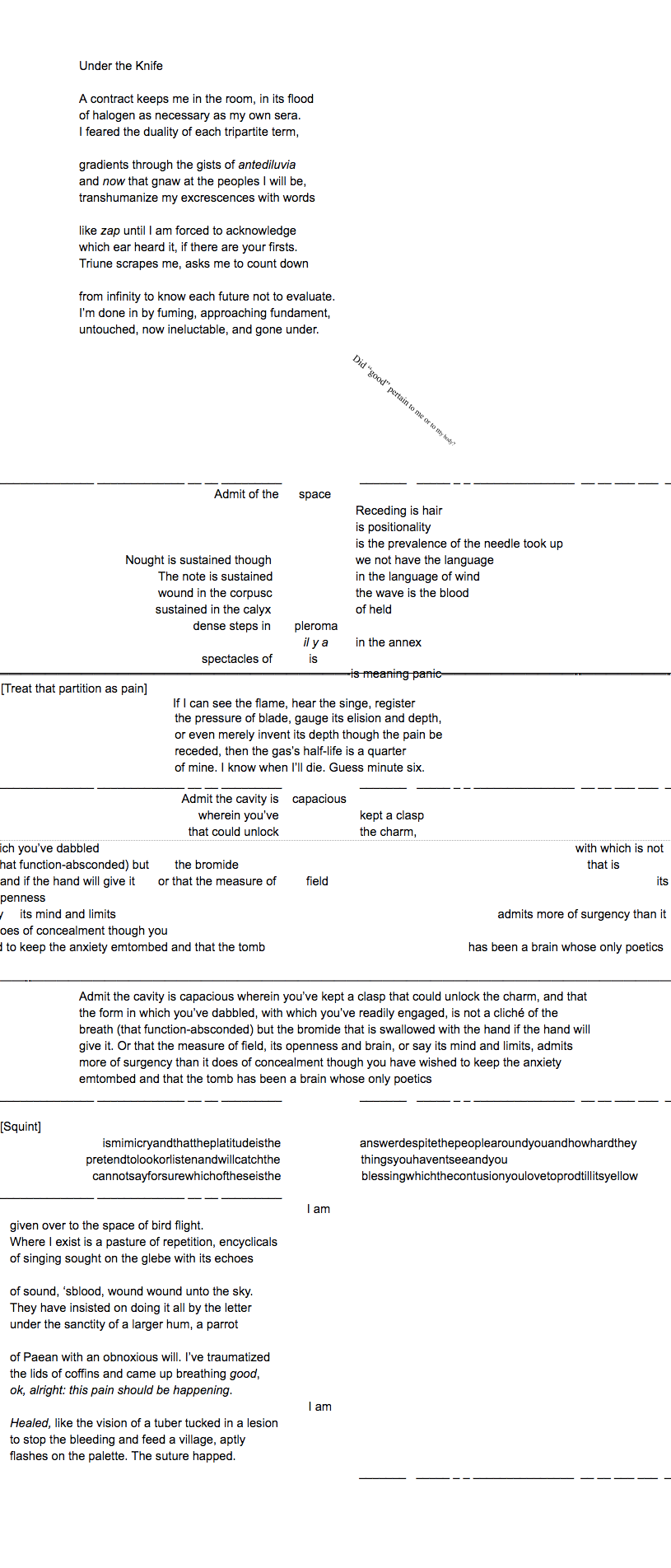3.05 Under the Knife
Colin Dekeersgieter

Process:
“Feelin Ok felt to me as if it were dancing around the root of thought, moving into and out of a pre-Adamic, sludgy consciousness. This initially elicited dread and so gave off the vibe of the negative (the only) Sublime. It accomplished this through the impression of having work done, which is at once elective and passive. Taking ‘root’ in that regard I wanted to explore the hypochondriacal anxiety/elation around ‘going under.’
I fear that in one way or another I will eventually have to go under the knife, and with that comes the potential of not waking up. But the piece opened me up into a passive consciousness and the empathetic mind elected the work’s anesthetic and thankfully arose from its passive, primordial soup to a renewed pronouncement of consciousness registered in the delight of horripilation that I felt at the arrival of the final voice, hence the synesthesia in the last stanza. I didn’t want to lose the feeling of the process of Feelin Ok: The dread of going under and the delight of returning that is registered in the impression of the miasma taking form through repetition, birdcall, and finally human language. So I only listened to the work twice during the writing of 'Under the Knife', once directly before the first stage of composition and once directly after. (I have listened to it since and can say that what it culls still inspires.) When writing the piece between listens, I played Schoenberg’s ‘Serenade, opus 24’, whose bounce of the bow on the bass and eventual return to language mirrored the elements I harped on in Feelin Ok.
What was most important for me after listening to Feelin Ok for the first time was that I realized that the stakes of the procedure are not what I fear, nor is slipping away — so long as the anesthetic has kicked in — but rather that I will be forced to elect the loss of control. With that realization of the root of my anxieties around ‘going under’ came the realization that poetry itself is the election of the loss of control, followed by an invasive shock of surgery, and then the slow healing that is editing. This poem then is an act of relinquishing control, a speech act under the influence of the bright anesthetic of another's work.
I would like to note that the roots of my poetry are in rhyme, be it euphonic or for the eye and brain at once, as in homophones. But the spirit of tele -, the spirit of serious play, and the piece I was given instigated a challenge of my own forms and a breakdown (/rebuilding) of those forms respectively. So instead of focusing on the sound of language, which is at the root of most of my poetry, I opted for sense rhyme in the first and last strophes (the lucid strophes) to mirror the slight variations of motifs that occur in Feeling Ok. The sense rhymes are etymological rhymes and occur in an ABC/ABC // DEF/DEF format. That is ‘flood’ rhymes with ‘antediluvia’ and ‘sera’ (plural of serum) rhymes with ‘will be’ through the Spanish, as in (lo) que será, será . . . “
—Colin Dekeersgieter
+Bio
Colin Dekeersgieter's poems have appeared or are forthcoming in the North American Review, Green Mountains Review, The Paris-American, and elsewhere. He is a PhD candidate in English Literature at UNC, Chapel Hill with an MFA in Poetry from NYU and an MA from the CUNY, Graduate Center.